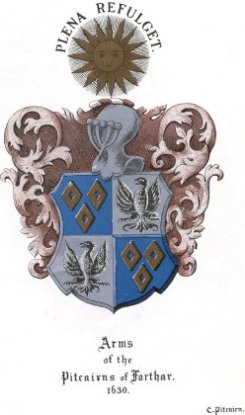|
Notes
Sir James
Pitcairn, Inspector-General of Hospitals for Ireland, Chief of the
house of Pitcairn, 22nd in descent, was born at Little Bedwin,
Wilts 18th July 1776.
He was the eldest son of the Rev Robert Pitcairn of that
Ilk, Rector of Englishcome, Somerset, and of Denne Mallam, his
wife. James Pitcairn
lived in London in his young days, was educated there, and then
went to study at St George’s Hospital, he and Sir Benjamin
Brodie being fellow pupils of Sir Everard Home.
He
graduated at Edinburgh and became house surgeon at St George’s
Hospital, prior to settling down to practice in London.
When there he was mentioned by Sir Everard Home as a
promising young surgeon and nominated by him Staff surgeon to the
Forces in Holland in 1799. He
then went to Holland.
Pitcairn
was then sent to Sir Ralph Abercrombie’s fore in Egypt, where he
served until the end of that campaign, and received a medal.
He returned to England in 1802, and was placed on the
recruiting staff of Dublin, which he held until 1803.
On the 22nd of October 1803, at the age of
twenty-seven, he was appointed Deputy Inspector of Military
Hospitals for Ireland, and the day following Deputy
Inspector-General.
He
married on the 24th of September 1803, at Cheshunt,
Harriet, who was born Feb 3 1774 youngest daughter of Charles
James Dalbiac, of Chramount in Hertforshire, and Hungerford Park
in Berkshire. Her
mother was Mr Dalbiac’s second wife (nee Miss Anne le Bas).
The Dalbiac's were descended from and Old French family.
In 1804,
1805, and 1808, Dr James Pitcairn was deputed to superintend the
extensive encampments formed on the Curragh of Kildare, under Lord
Cathcart and Sir Charles Aspill, during which time, until 1815, he
was in medical charge of the Connaught district of Ireland.
In 1816, Pitcairn was transferred to Munster, and then to
Cork. When he left
Athlone he was much regretted, and was presented with a beautiful
service of plate.
In 1832
there was a dreadful outbreak of cholera. There was a Board of Health Meeting at the Mansion House, on
the 18th of April, of all the Faculty.
Upwards of 700 were present, and Dr Pitcairn was in the
Chair. He made an
excellent speech. A Letter or notice was addressed by them to the
Mayor with suggestions of preventions against cholera, signed by
Charles Daly M.S. J. Pitcairn M.S. and two others.
By the strange irony of fate, Mrs Pitcairn was attacked by
this dreadful disease, (cholera) and died, after twenty-four hours
illness, on the 11th day of July 1832.
So great was the dread of contagion, that her husband and
her friends had to lay her in the grave, and even dig it, so great
was the scare at the time.
In 1837
Dr Pitcairn received the honour of knighthood from the hands of
Lord Normanby, in Dublin, on account of his professional services,
and in 1847 Sir James was appointed Director-General of the
Medical Department for Ireland, the duties of which he performed
without interruption until 1852, when he retired from the Service,
and was presented with a service of plate by his medical friends.
He had
been seen much trouble, he had lost his beloved wife and four
children before 1837. He
was a religious man, with a most cheerful disposition, very
pleasant and tactful, and much beloved by every one with whom he
came in contact, from his unfailing courtesy, and real goodness of
heart.
To his
children he was always a most kind, just, and indulgent Father;
and if he had to reprove them he did it in such a pleasant way
that it was more effectual than if they had been scolded.
My father used to tell us how when a little boy he
sometimes put his elbows on the table at dinner.
Instead of scolding him, his father simply turned to the
butler; “A pillow for Master Jacko,” and down would go the
elbows like a shot. “Leave a little for the Duke of Rutland’s family, boys”
(manners), he used to say, if they at dinner were inclined to be
greedy. They were
taught to take off their hats if a funeral passed, and say
“Sir” to an old man. On
Christmas Day he always gave two toasts: First, “To absent
friends,” and secondly, “Here’s a health to all those that
we love; here’s a health to all those that love us; here’s a
health to all those, that love them that love those, that love
them, that love those, that love us.”
At Cork,
where he lived for thirty-one years, he had a delightful circle of
friends. He was of such a kindly nature himself, that he loved to
be surrounded with young folks, and he was most hospitable,
perpetually inviting the officers of the different regiments who
were quartered at Cork, or who were embarking or disembarking at
Queenstown. He had a
bright and cheery life.
Sir James
married, secondly, Miss Emma Polocke, and had one son, who died
young, and one daughter, Emmeline, who married Mr Rice of the
Indian Civil Service. She
had two sons, Stanley and Frank, and three daughters living.
Sacred
to the Memory of Sir James Pitcairn M.S. Inspector-General of
Hospitals, who died in Dublin the 12th day of January
1859 in the 83rd year of his age.
He was beloved as a husband, a father and a friend and
having for fifty-three years faithfully discharged the Duties of
the Public service,, he has gone down to the grave in peace, and
in sure and certain hope of the Resurrection to Eternal Life.
“With Christ, which is far better”
|


